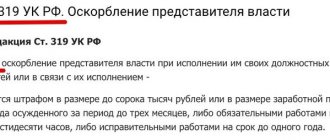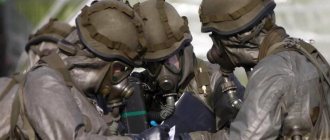ST 318 of the Criminal Code of the Russian Federation.
1. The use of violence not dangerous to life or health, or the threat of violence against a representative of the authorities or his relatives in connection with the performance of his official duties - is punishable by a fine in the amount of up to two hundred thousand rubles or in the amount of the salary or other income of the person convicted of a period of up to eighteen months, or forced labor for a term of up to five years, or arrest for a term of up to six months, or imprisonment for a term of up to five years.
2. The use of violence dangerous to life or health against the persons specified in part one of this article is punishable by imprisonment for up to ten years. Note. In this article and other articles of this Code, a representative of the government is recognized as an official of a law enforcement or regulatory agency, as well as another official vested with administrative powers in accordance with the procedure established by law in relation to persons who are not officially dependent on him.
Corpus delicti
If you follow the letter of the law, then the crime under Art. 318 occurs when the following conditions are simultaneously met:
- violence (threat of violence) is carried out against a government official or his relatives;
- violence (the threat of its use) is carried out in connection with the performance of official duties by a government representative.
Thus, the object of the crime is a representative of the authorities or his relatives. According to the note to Art. 318 a representative of authority is an official of a law enforcement or regulatory agency, as well as another official vested with administrative powers in relation to persons who are not officially dependent on him.
Violence is used in the presence of direct intent; a motive is required, which must be related to the performance by a representative of the authorities of his official duties. The actions of the perpetrator are usually caused by a sharply negative attitude towards what the victim has done, is doing or should do. Violence may be used:
- to obstruct the performance of duties (resisting a police officer during arrest, attacking a police officer during execution);
- to force someone to take any action;
- because of revenge.
Violence can be expressed in various forms, mental or physical in nature. Mental influence is a threat of violence, the method of its expression can be verbal, including by telephone, in writing, threatening gestures, or demonstration of weapons. Physical violence is beating, including using “improvised” means, infliction of physical pain, restriction of freedom, for example, tying hands or leaving someone in a closed area.
The massive use of Art. has caused a great resonance in society. 318 to participants in the 2022 Moscow protests, including for throwing plastic cups at police. According to Dmitry Peskov, press secretary of the Russian President, for this in America “they would have been shot without trial, and the policeman would have received a reward.” Many did not agree with this and considered this application of Art. 318 excessive, not seeing signs of violence against law enforcement officers in the throwing of plastic cups.
Commentary to Art. 318 of the Criminal Code
1. The following are recognized as victims: a) officials of law enforcement (see commentary to Article 317) or regulatory authorities. Supervisory authorities include government bodies whose main function is to monitor and verify compliance with the law in a certain area, for example, environmental, technological and nuclear supervisory authorities, the federal tax service, the federal service for supervision of consumer rights protection and human well-being; b) other officials who are vested in the prescribed manner with administrative powers in relation to individuals or legal entities who are not officially dependent on them.
A special type of victim is those close to government officials.
2. The act in the objective aspect of the main composition covers two types of unlawful violent actions: a) physical violence that is not dangerous to the life or health of the victim, meaning restriction of freedom, beatings or the commission of other violent actions that caused physical pain, but did not entail the consequences indicated in Art. 115 CC; b) a clearly expressed threat of violence. The content of the threat, the ways of expressing it and communicating it to the victim are not specified in the law.
3. Physical violence and the threat of violence must be applied to the victim without fail in connection with the legitimate performance of his official duties. Typical situations of the use of violence: a) during the performance of official duties by a representative of the authorities in order to stop their performance or force a person to perform certain actions; b) in order to impede the future activities of a government representative; c) out of revenge for past activities.
The indication “in connection” provides for the need to distinguish the crime in question from those cases of causing harm to the victim’s health that are caused by personal hostile relationships or incorrect actions of the victim.
4. Qualified personnel (Part 2) are identified based on the nature of the violence used, which must be dangerous to life or health (violence that, in its method, poses a danger to these benefits or in its consequences entails harm to health). The moment the crime ends is the commission of the first violent act against the victim, which is objectively capable of causing harm to his health of any severity.
5. Are not under the protection of Art. 318 of the Criminal Code are representatives of authorities involved in the administration of justice or in the conduct of a preliminary investigation (Article 296 of the Criminal Code).
Punishment under Art. 318 of the Criminal Code of the Russian Federation
Art. 318 provides for two types of punishments for assault on a police officer during execution and violence against a government official:
- the use of violence, an attack on an official during execution, which is not dangerous to life or health, or the threat of violence is punishable by a fine of up to 200 thousand rubles or in the amount of the income of the convicted person for a period of up to 18 months, or by forced labor for up to 5 years, or arrest for up to 6 months, or imprisonment for up to 5 years (Part 1);
- attack or beating of a police officer, dangerous to his life or health, causing harm to the health of a police officer is punishable by imprisonment for up to 10 years (Part 2).
Article 318. Use of violence against a representative of authority (Criminal Code of the Russian Federation)
- home
- Laws
- Criminal Code of the Russian Federation
1. Use of violence not dangerous to life or health, or threat of violence against a government official or his relatives in connection with the performance of his official duties -
shall be punishable by a fine in the amount of up to two hundred thousand rubles, or in the amount of the wages or other income of the convicted person for a period of up to eighteen months, or by forced labor for a term of up to five years, or by arrest for a term of up to six months, or by imprisonment for a term of up to five years (in as amended by the Federal Law of December 8, 2003 N 162-FZ - Collection of Legislation of the Russian Federation, 2003, N 50, Article 4848; Federal Law of March 7, 2011 N 26-FZ - Collection of Legislation of the Russian Federation, 2011, N 11, Article 1495; Federal Law of December 7, 2011 N 420-FZ - Collection of Legislation of the Russian Federation, 2011, N 50, Article 7362).
2. The use of violence dangerous to life or health against the persons specified in part one of this article -
punishable by imprisonment for a term of up to ten years (as amended by Federal Law of March 7, 2011 N 26-FZ - Collection of Legislation of the Russian Federation, 2011, N 11, Art. 1495).
Note. In this article and other articles of this Code, a representative of the government is recognized as an official of a law enforcement or regulatory agency, as well as another official vested with administrative powers in accordance with the procedure established by law in relation to persons who are not officially dependent on him.
open a section in a document find materials
Article 317. Encroachment on the life of a law enforcement officer
Article 318. Use of violence against a representative of the authorities
Article 319. Insulting a representative of the authorities
Questions and answers on Article 318
#63538 19.02.2022 (20:24)
How to prove the case and reclassify a criminal case
Hello! I won't describe everything. ST 318 part 1 of the Criminal Code, falsification In May 21st, there was a conflict with a local police officer who came to me on a call. He wanted to take me to the department, grabbed me by the hands, and when I tried to pull his hands away, he fell on me and injured his knee. While trying to get up, I headbutted him in the face. Then to the department, from there to the Investigative Committee. He testified as it happened. Later in the Investigative Committee, the investigator said - you speak and agree with the testimony of the victim and I will sign a signature (or in a pre-trial detention center) and then at the trial there will be a special order and, at worst, conditions. He does a forensic examination - it did not cause any harm to health, and the expert demands that he undergo an MRI of the knee joint within a month. The victim does not have time, or does not want to, there is no money, he is late and does not meet the deadline for a month, by 5-6 days. I find out this later (after 8 months I find out in the second examination), where there is already moderate harm to health (more than 3 weeks) and an indictment as serious harm to health, and accordingly reclassification to 318 Part 2. Oh, how, he specially admitted under Part 1, they took advantage of him and reclassified him as Part 2. Is this legal, we are waiting for a trial. After 2 months, a year from the beginning of the incident, apparently it was constantly extended or gathering dust on a shelf in the UK. The investigator was changed in the fall. I was not notified. Accordingly, I could not ask my questions to the judge. There are a lot of contradictions in the case - the time of the event, his initials and mine are mixed up, there are no signatures on certain papers (apparently falsification of documents, I am not fully familiar with the case). In general, the case is done if it goes through the prosecutor’s office, but then it’s a circus, damn the state. Is the second trial legal? And that's not it. 02/04/21 the investigator of the Investigative Committee calls to his office, because The prosecutor returned the case for further investigation. I signed the indictment, but still haven’t received it in my hands. I read and photographed only the materials for volume 1 (the main one), the rest, he said, you will receive upon receipt of the indictment. I asked for a repeat forensic examination and to summon the expert and my mother to court, but he said he would refuse. PS: The case under Part 318 Part 2 of the Criminal Code (came out of Part 1, somehow “accidentally”, I don’t understand, based on an additional delusional forensic examination) has been dragging on for almost a year, suspended twice, and again (allegedly due to Covid) , the last time was in the UK, now I don’t know where. In general, this is not the question. This point is of interest - there are diseases confirmed by a doctor’s report (G95.9, I69.3, according to ICD-10). With these diagnoses, the court does not have the right to actually deprive of freedom - if by law. When considered in court, will this be the basis for a real “not imprisonment”, but a condition? Or is it still at the discretion of the court? If so, what are the laws then? I don’t want to play roulette... A separate question - I was in drug treatment (after what happened - the death of a relative), I drank enough, will this be a plus (since I don’t drink now), or not to mention.
Author: Novostok Replies: 21 Reply Read more
#48583 13.11.2019 (11:03)
Should I admit something I didn’t do on the advice of a lawyer?
I have a trial under Article 318 Part 1, all the evidence is against me, I can’t prove the opposite, a police officer found two witnesses, a bruise appeared on his shoulder from somewhere, the lawyer tells me that if you admit guilt in court, they may not close you down, but you will deny it and stand You won’t be able to prove anything on your own and they will definitely close it, what should I do in this situation?
Author: Yuri Replies: 3 Reply Read more
#45372 16.08.2019 (09:21)
You can leave on parole, article 318 part 2
Hello, is it possible to leave on parole with Article 318 part 2? He is on an improved regime without violations, 2.5 years left until the end of his term
Author: Svetlana Replies: 1 Reply Read more
#41880 24.05.2019 (10:50)
What threatens me for this and how to behave with the investigator
The situation is like this. we were stopped by traffic police officers and accidentally saw my ID, after which they began to insist that it was fake. I ran away and then came back. They started detaining me for no clear reason. They started using physical force and pushed me into the car upside down. After that I tried run away from them and the employee caught hold of me and fell. I skinned my hand and broke off a piece of my tooth. Then they detained me, handcuffed me and took me to the department.
Author: novel Replies: 3 Reply Read more
#34473 30.12.2018 (06:37)
Article 158 Art. 161ch2 Art. 318 Art. 319
My husband and I, Articles 158 (confession) 161ch2 (damages were compensated, no claims were reconciled) 318 and 319 (no claims were reconciled) chose a special procedure. We weren’t involved before and we have two small children. What shines for us
Author: Natalya Replies: 8 Reply Read more
Useful information and samples on Article 318
20 0
27.12.2021
The Supreme Court explained why it is not enough to apologize to dismiss the case under Article 318 of the Criminal Code of the Russian Federation
Group: Criminal law and process Author: Dmitry Vasilievich Polyakov
More details
137 0
12.11.2021
The Supreme Court explained how to evaluate the intoxication of the accused and the opinion of the victims about punishment
Group: Criminal law and process Author: Dmitry Vasilievich Polyakov
More details
372 2
01.06.2020
So much for the law.
Group: Judicial practice Author: Zakharov Evgeniy Evgenievich
More details
Arbitrage practice
In 2020, 6,287 people were convicted in Russia for causing violence against a government official (3rd place among articles of Chapter 32 of the Criminal Code), of which about 5,687 were convicted under Part 1, 600 under Part 2. 23% of those convicted under Art. 318 of the Criminal Code of the Russian Federation were sentenced to imprisonment, 44% to suspended imprisonment, 31% to a fine, and the rest to other types of punishment.
In recent years, judicial practice has demonstrated a consistent tightening of the penalties imposed under Art. 318. Experts draw this conclusion based on the results of an analysis of the verdicts. It can be assumed that this trend is caused by the desire of the authorities to strengthen the protection of their representatives from illegal attacks. However, this reduces the possibilities for defending the accused. Thus, the practice of issuing decisions to refuse requests to terminate criminal cases in connection with the reconciliation of the parties has become widespread.







